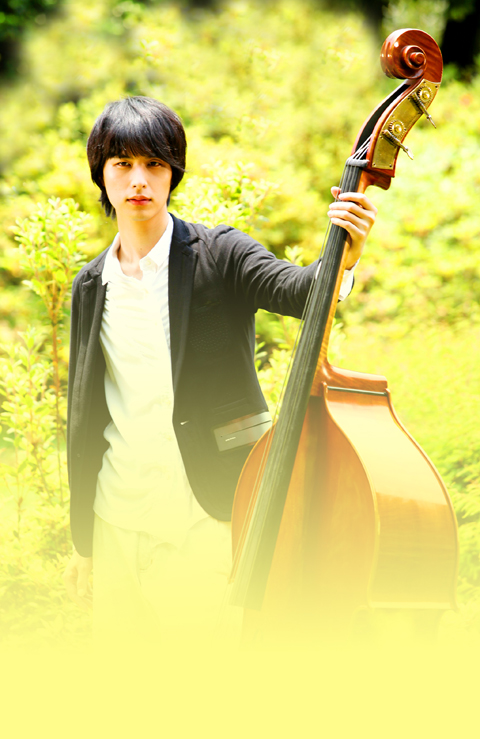Yen-j (嚴爵) is that rare newcomer to the Mando-pop scene who possesses both good looks and talent in spades.
The singer/songwriter and producer’s debut album Thanks Your Greatness (謝謝你的美好) brilliantly combines jazzy flourishes and catchy pop for ebullient musical musings on romance and other meaningful pursuits. It peaked at No. 2 on G-Music’s Mandarin album chart after its release last month and has been lauded by veteran entertainers Dee Hsu (徐熙娣), better known as Little S (小S), and Wang Lee-hom (王力宏). Two tracks became theme songs for TV soap dramas My Queen (敗犬女王) and P.S. Man (偷心大聖PS男).
“I spent 20 months recording this album,” said Yen-j, whose concert tomorrow night at Riverside Cafe (河岸留言) has already sold out. “I went through a period in which I wrote one song per day and I must have accumulated a hundred songs.”

“My label trusts me enough to allow me to produce my own album the first time out. In order to come up with the best result, I re-recorded all the songs numerous times.”
Yen-j performs two sets at Riverside Cafe tomorrow night in an evening titled Yen-j “I Like … No, I Love Yen-j” Concert (嚴爵“我喜歡…不,我愛嚴爵”演唱會) as a warm-up for his first stadium gig, Yen-j 「Endless Beauty Version」 Concert (嚴爵“無限美好版”演唱會), at National Taiwan University’s Sports Center (台大綜合體育館) on July 18. At Riverside, Yen-j will spend one set performing unplugged versions of songs from his album and the next set paying tribute to his idols, who include Jay Chou (周杰倫), Wang Lee-hom, Khalil Fong (方大同) and Stevie Wonder.
A native of Kaohsiung, Yen-j moved to the US to attend school at the age of 10. He took up piano and trombone early on and started performing in San Francisco’s jazz bars with his high school teachers.
“I did not have the typical high school years because I was busy performing,” Yen-j said in an interview earlier this week. “I was lucky to have that opportunity to perform, though.”
After high school, he moved to Los Angeles to study music at the University of Southern California. Already a prolific songwriter with a demo in hand, he made the unusual decision to withdraw from USC after his first semester and move back to Taiwan.
“I figured I would only steer away from the opportunity of becoming a [career] singer if I stay for four years in college,” Yen-j, now 22, explained. “My father was understanding enough to support my decision.”
It took Yen-j only three months to land a record contract. In January this year, he released the EP Trapped in Taipei (困在台北) and embarked on a 44-gig live-house tour throughout the country to cultivate audiences and get used to performing live alone.
“I was a jazz instrumentalist in the beginning and learned to sing later on,” Yen-j said. “Performing live wasn’t that enjoyable in the beginning because I was just learning the ropes. Gradually,
I learned to enjoy it and interact with the audiences.”
Yen-j continues writing songs every day as a way to relieve stress, even during his current hectic promotional schedule.
“Either the beat, some lyrics or a segment of melody would appear, and I continue to finish the song,” he said.
“I have accumulated a whole bunch of songs for the subsequent albums,”
he laughed. “But the label says they won’t listen to the new songs until I finish the promotion and concert [for] the current album.”

Taiwan has next to no political engagement in Myanmar, either with the ruling military junta nor the dozens of armed groups who’ve in the last five years taken over around two-thirds of the nation’s territory in a sprawling, patchwork civil war. But early last month, the leader of one relatively minor Burmese revolutionary faction, General Nerdah Bomya, who is also an alleged war criminal, made a low key visit to Taipei, where he met with a member of President William Lai’s (賴清德) staff, a retired Taiwanese military official and several academics. “I feel like Taiwan is a good example of

March 2 to March 8 Gunfire rang out along the shore of the frontline island of Lieyu (烈嶼) on a foggy afternoon on March 7, 1987. By the time it was over, about 20 unarmed Vietnamese refugees — men, women, elderly and children — were dead. They were hastily buried, followed by decades of silence. Months later, opposition politicians and journalists tried to uncover what had happened, but conflicting accounts only deepened the confusion. One version suggested that government troops had mistakenly killed their own operatives attempting to return home from Vietnam. The military maintained that the

Taipei Mayor Chiang Wan-an (蔣萬安) announced last week a city policy to get businesses to reduce working hours to seven hours per day for employees with children 12 and under at home. The city promised to subsidize 80 percent of the employees’ wage loss. Taipei can do this, since the Celestial Dragon Kingdom (天龍國), as it is sardonically known to the denizens of Taiwan’s less fortunate regions, has an outsize grip on the government budget. Like most subsidies, this will likely have little effect on Taiwan’s catastrophic birth rates, though it may be a relief to the shrinking number of

Since its formation almost 15 years ago, Kaohsiung rock band Elephant Gym (大象體操) has shattered every assumption about contemporary popular music, and their story is now on screen in a documentary titled More Real Than Dreams. It’s an unlikely success story that says a lot about young people in Taiwan — and beyond. For a start, their sound is analog. In the film, guitarist Tell Chang (張凱翔) proudly says: “There is no AI in our sound.” His sister, bass player KT Chang (張凱婷) is the true frontwoman — less for her singing abilities than for her thunderous sound on the instrument. Fast like